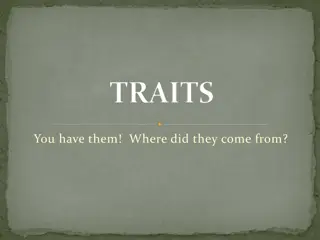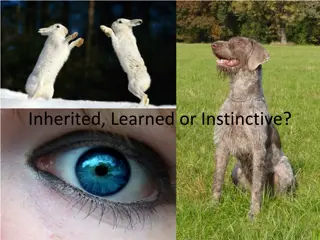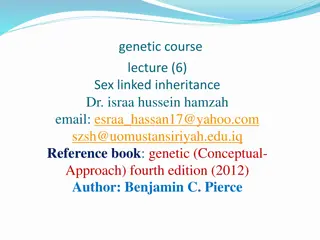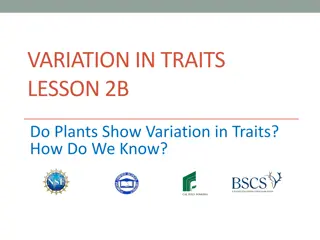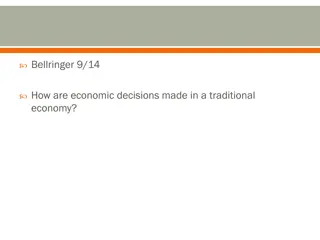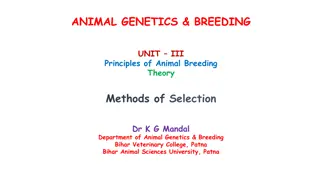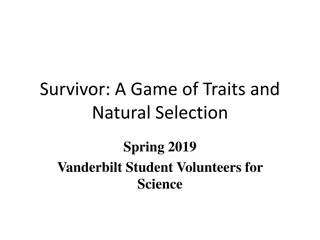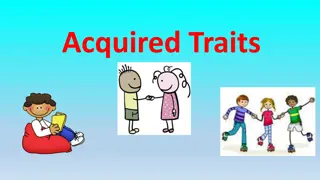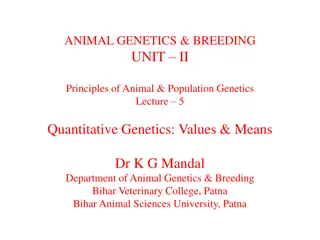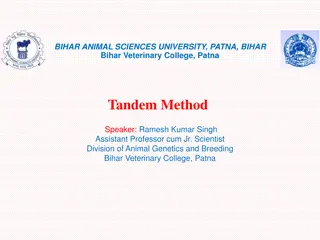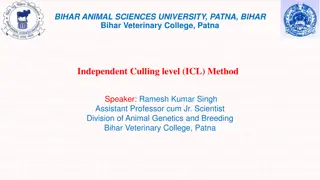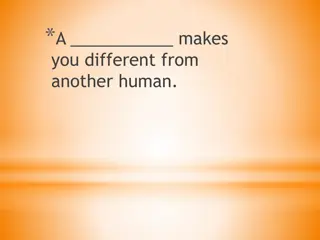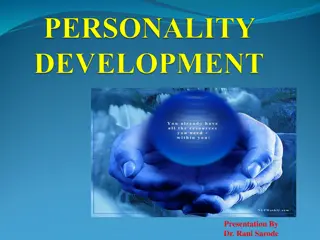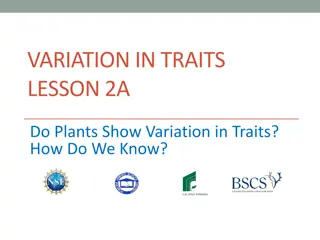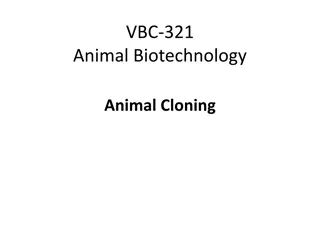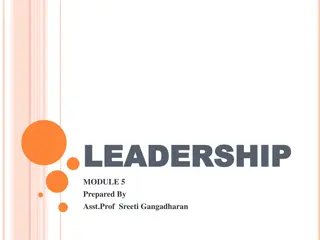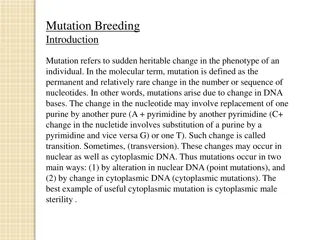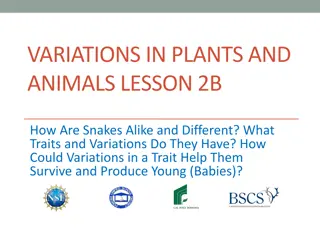2023/24 Annual Performance Plan Presentation for Small Business Development Department
The presentation outlines the 2023/24 Annual Performance Plan of the Department of Small Business Development, covering situational analysis, global economic outlook, performance priorities, game-changers program, alignment with economic recovery plans, institutional program performance, key risks a
27 views • 59 slides
U.S. Virgin Islands Economic Development Authority Webinar: Small Business COVID-19 Resources
The U.S. Virgin Islands Economic Development Authority held a webinar focused on providing resources and assistance for small businesses impacted by COVID-19. The agenda covered the overall economic impact, reliable resources, SBA Economic Injury Disaster Loan (EIDL), and the tourism industry. Speak
0 views • 13 slides
Unraveling the Mystery of Traits and Genes
Explore the fascinating world of traits and genes, understanding how they are passed down from parent to offspring through chromosomes. Delve into the role of genes in controlling various traits such as hair color, eye color, and even unique characteristics like detached earlobes and widow's peak. D
0 views • 11 slides
Understanding Cultural Traits and Complexes in Society
Culture is a complex whole that encompasses various aspects such as knowledge, beliefs, arts, morals, laws, customs, and more. Cultural traits, at the simplest level, are individual tools, acts, objects, or beliefs related to specific situations or needs, while cultural complexes are groups of inter
0 views • 18 slides
Understanding Inherited, Learned, and Instinctive Traits in Organisms
Traits in organisms can be inherited, learned, or instinctive. Inherited traits are genetic and include characteristics like hair color and disease predispositions. Instinctive traits are inherent behaviors such as sleeping and grooming. Learned traits are behaviors acquired for survival, like house
0 views • 20 slides
Understanding Sex-Linked Inheritance: Key Concepts and Examples
Sex-linked inheritance refers to the transmission of genetic traits determined by genes located on the sex chromosomes. This type of inheritance differs from autosomal inheritance due to the unique characteristics of the X and Y chromosomes. In organisms with XX/XY sex determination, genes on the X
1 views • 21 slides
Exploring Plant Traits: Do Plants Exhibit Variation in Traits?
Discover in this lesson whether plants display variations in traits through the measurement of plant lengths. Students analyze data tables of carrots and leaves to observe trait variations and discuss patterns found in bar graphs and data tables. The focus is on understanding how to identify and int
0 views • 11 slides
Exploring Leadership Theories: Traits and Behaviors
Leadership theories have evolved from trait theory focusing on personal qualities to behavioral theories emphasizing actions and interactions. While early research sought universal traits for leadership, it encountered challenges due to varied traits among leaders and non-leaders. Behavioral theorie
2 views • 29 slides
Economic Systems in the United Kingdom, Germany, and Russia
Economic decisions in traditional economies are based on customs and beliefs. The United Kingdom has a mixed market economy with a focus on service industries, while Germany's economy is export-based. Russia's economy leans towards a command system. By comparing these economic systems, one can see h
0 views • 11 slides
Understanding Key Concepts in Economic Geography
Economic Geography is a sub-discipline that utilizes a geographical approach to analyze the spatial distribution of economic activities at various scales. It focuses on the location of economic activities and their relationship with the environment, encompassing primary, secondary, and tertiary sect
1 views • 20 slides
Principles of Animal Breeding Theory and Methods of Selection
Animal breeding involves selecting for desirable traits to improve the overall merit of animals. Methods such as tandem selection and multi-trait selection are used to enhance genetic progress. Economic value, genetic significance, and selection criteria play important roles in the breeding process.
1 views • 16 slides
Contrasting Qualitative and Quantitative Traits in Genetics
Genetic traits in organisms can be qualitative or quantitative, with qualitative traits controlled by single genes and showing distinct variations, while quantitative traits are influenced by multiple genes and environmental factors, resulting in continuous variations. Qualitative genetics focuses o
0 views • 13 slides
Understanding Personality Traits and Assessments
Psychologists utilize traits to describe personality, addressing common misunderstandings about introversion and exploring the strengths and weaknesses of personality inventories. The consistency of personality traits over time and across situations is examined, along with the identification of insi
0 views • 38 slides
Explore the Science of Natural Selection and Traits
Dive into the fascinating world of natural selection and traits with a focus on how organisms adapt to their environments. Learn about the importance of Charles Darwin's theories, the role of traits influenced by genes and the environment, and how natural selection drives the survival of the fittest
4 views • 13 slides
Understanding Acquired Traits and Learned Behaviors in Living Organisms
Acquired traits are physical characteristics acquired during a living thing's lifetime, such as scars, and are not passed down from parents. Many acquired traits are also learned behaviors, like reading or flying, which animals develop after birth. Learned behaviors, unlike inherited instincts, are
4 views • 15 slides
Understanding Quantitative Genetics Principles in Animal Breeding
Quantitative genetics focuses on the inheritance of characteristics based on degree rather than kind, compared to qualitative genetics. It involves polygenes controlling quantitative traits, which exhibit continuous variation and can be measured using metric units. Qualitative traits, on the other h
0 views • 22 slides
Tandem Method in Animal Breeding: Sequential Traits Selection
Tandem method in animal breeding involves selecting useful traits sequentially to improve genetic performance. Breeders focus on one trait until a desired level is achieved before moving on to the next trait. While effective in targeted improvement, the method can lead to loss of previously improved
0 views • 6 slides
Independent Culling Level (ICL) Method in Animal Breeding
The Independent Culling Level (ICL) method involves selecting multiple traits simultaneously in animal breeding. Breeders set minimum or maximum culling levels for each trait, ensuring continuous improvement in desired characteristics through successive generations. However, challenges exist in dete
0 views • 6 slides
Fostering Economic Development Through Community Economic Development
Community Economic Development (CED) involves local actions to create economic opportunities improving social conditions, especially for the disadvantaged. It recognizes the interdependence of economic, environmental, and social challenges, emphasizing solutions rooted in local knowledge. The ultima
1 views • 30 slides
Exploring Ancestry and Traits Through SNPedia and PCA Analysis
Delve into the world of genetics and ancestry analysis through SNPedia, a comprehensive resource for Single Nucleotide Polymorphisms (SNPs) information. Discover how Principle Component Analysis (PCA) simplifies genetic data to reveal insights into ancestry, traits, and informative SNPs. Explore exa
0 views • 33 slides
Enhancing Economic Statistics in Asia-Pacific Region
The Regional Programme on Economic Statistics aims to improve economic statistics in the Asia-Pacific region by enhancing capacity and coordination among National Statistical Offices (NSOs) and other stakeholders. The programme focuses on implementing the Core Set of Economic Statistics to facilitat
0 views • 11 slides
Understanding Genotype and Phenotype in Hereditary Traits
Exploring simple heredity through predicting and modeling phenotypes of Crazy Creatures, students are tasked with contrasting genotype and phenotype. The Crazy Traits lab data table is essential for recording alleles and genotypes, aiding in determining phenotypes for 14 different traits. By complet
0 views • 4 slides
Understanding Entrepreneurship: Traits, Impact, and Key Figures
Exploring the world of entrepreneurship reveals the essence of risk-taking, innovation, and driving economic growth. Entrepreneurs are the backbone of small businesses, driving change, and introducing groundbreaking ideas. Discover the origins and evolving definitions of entrepreneurship, along with
0 views • 13 slides
Understanding Objective Personality Tests and Traits
Explore various objective personality tests and traits, including examples of uni-dimensional traits such as Locus of Control, Type A/B personalities, Tolerance for Ambiguity, Need for Cognition, Bem Sex-Role Inventory, and more. Delve into the concepts introduced by psychologists like Julian Rotter
0 views • 14 slides
Understanding Genetics and Evolution through Traits and Adaptation
Exploring concepts like traits, mutations, adaptations, and genetic changes in organisms to comprehend what makes individuals unique and how species evolve and adapt over time. The content delves into the inheritance of traits, the role of DNA segments, and distinguishing characteristics in living b
0 views • 29 slides
Overview of Economic Policy: From Mercantilism to Present-Day Practices
Explore the concept of economic policy and its importance in achieving economic objectives. Delve into the historical debate on state intervention in the economy and major schools of economic theory like Mercantilism. Understand the emergence of economic policies through economic, political, scienti
0 views • 105 slides
Exploring Personality Development and Traits
Understanding the importance of personality development, this presentation by Dr. Rani Sarode delves into the various aspects that define an individual's character and behavior. It discusses the significance of traits like communication skills, interpersonal relationships, attitude towards life, and
0 views • 24 slides
All About Team Building, Teamwork, and Leadership Traits
Explore the importance of team building, teamwork, and essential leadership traits. Learn about the purpose of a team, the need for teams in companies, forming effective teams, and the character traits that contribute to team success. Discover roles and responsibilities within a team to enhance coop
0 views • 33 slides
Exploring Plant Traits: Understanding Variation in Characteristics
Delve into the world of plant traits and variation in this interactive lesson. Discover how plants exhibit different traits and explore the concept of variation within species. Engage in investigations, measurements, and discussions to deepen your understanding of plant characteristics. Uncover the
0 views • 12 slides
Applications of Transgenic Animals in Biotechnology and Cloning
Cloning in animals offers the advantage of indefinite duplication of elite genotypes without the genetic risks of meiosis. Transgenic animals, genetically modified to carry foreign genes, play a crucial role in genetic research and the development of livestock with desired traits. Methods like DNA m
0 views • 13 slides
Leadership Insights: Traits, Differences, and Framework
Leadership involves guiding others towards shared goals through vision, inspiration, knowledge, and resilience. It distinguishes from management in focus and approach. Analyzing leadership involves assessing leader traits, situational factors, and follower dynamics. The leadership framework comprise
0 views • 36 slides
Understanding Genetics: Mendel's Experiments and Inheritance Patterns
Delve into the world of genetics through Mendel's groundbreaking experiments with pea plants, exploring traits inheritance, Punnett squares, dominant and recessive alleles, incomplete dominance, and co-dominance. Gain insights into how traits are passed from parents to offspring and predict offsprin
0 views • 9 slides
Understanding Mutation Breeding in Crop Plants
Mutation breeding involves inducing heritable changes in crop plants through mutations, leading to genetic improvements for economic traits. This method is valuable when desired variability is lacking, for correcting genetic defects, overcoming linkage issues between desirable and undesirable traits
0 views • 22 slides
Exploring Snake Traits and Variations
Delve into the world of snakes to understand their shared traits and diverse variations. Discover how these variations in traits help snakes survive and reproduce, offering insights into their unique characteristics and evolutionary advantages.
0 views • 14 slides
Analysis and Forecast of China's Economic Development Trends - Guo Kesha Presentation
The presentation by Guo Kesha at the World Leather Congress in Shanghai delves into the analysis and forecast of China's economic development trends. It discusses whether a new cycle has opened for the Chinese economy, the potential for an L-type growth platform, and initial research on economic tre
0 views • 22 slides
Economic Review and Outlook 2011: Global Trends and Regional Impacts
The Provincial Economic Review and Outlook for 2011 highlighted the global economic performance and outlook, focusing on factors like GDP growth, employment trends, and socio-economic conditions in the Western Cape region. It discussed the recovery in global economic growth post-2009, with the IMF p
0 views • 29 slides
Unveiling Leadership Traits and Emotions Through Your Journey
Explore the essence of leadership traits and emotions in a visually captivating journey that delves into understanding and mastering the intricacies of leadership. From uncovering your unique traits to navigating through team dynamics, this collection of images offers insights to enhance your leader
0 views • 12 slides
Leadership Skills Overview: Traits, Theories, and Development
Explore leadership skills presented by Dr. Pushpinder Kaur Benipal, covering traits like adaptability, decisiveness, and social skills. Delve into early and functional leadership theories, understanding the importance of behavior over traits. Develop your own leadership potential with insights into
0 views • 15 slides
Understanding GWAS: A Brief Overview of Genetic Association Studies
GWAS, or Genome-Wide Association Studies, are a method used to map genes associated with traits or diseases by analyzing genetic markers throughout the genome. This process involves statistically testing the association between SNPs and traits using regression or chi-squared tests in a hypothesis-fr
0 views • 19 slides
ASTA.V&F Seed Conference 2015 - EI WG: Advancing Global Access to Plant Breeding Traits
The ASTA.V&F Seed Conference 2015 - EI WG focused on the launch of the International Licensing Platform Vegetable (ILP Vegetable) to enhance global accessibility to plant breeding traits. Discussions revolved around patents' impact on innovation, with 11 prominent companies collaborating to establis
0 views • 18 slides


